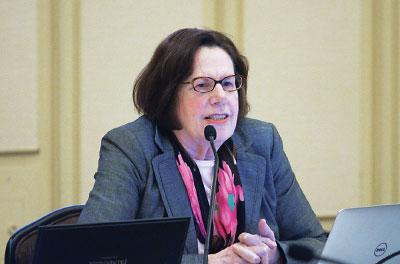Board Tackles Important Issues at October Meeting
Abstract
APA’s Trustees met in conjunction with its fall educational meeting, IPS: The Mental Health Services Conference—which was also on the Board’s agenda.
Connect. Equip. Inspire.

At last month’s board meeting, Area 2 Trustee Vivian Pender, M.D., updated trustees on her work representing APA as a non-governmental organization at the United Nations.
Those three words capture the essence of what APA members value about IPS: The Mental Health Services Conference, according to a work group charged with analyzing the strengths and weaknesses of the educational meeting that APA holds in the fall. The work group, appointed by immediate past APA President Anita Everett, M.D., and chaired by Paula Panzer, M.D., was charged with looking at how to better market the IPS to attract more attendees.
“Members who have been attending IPS for years are extremely passionate about this meeting,” said Ruth Shim, M.D., co-chair of the work group, in a report to the Board of Trustees last month. The Board met during the IPS meeting in Chicago. Shim was joined at the meeting by co-chair Michael Flaum, M.D.
Flaum and Shim highlighted the need for clarifying the name of the conference, identifying its target audience and ways to increase attendance, and developing key, clear marketing messages. The work group will continue to address these issues as well as examine the meeting’s structure and educational formats and identify potential host cities in smaller markets.
In other business at the Board meeting, former APA President Maria A. Oquendo, M.D., Ph.D., reported on the work of the Ad Hoc Work Group on Women’s Mental Health, which she chaired.
In her report, Oquendo reviewed the data that the work group had collected regarding the initiatives on women’s mental health already being conducted by APA components and administration. She also provided a summary of the viewpoints of the work group members regarding how to make women’s mental health issues more prominent within APA. The Board voted to accept the work group report and implement the following recommendations:
Ask that the Joint Reference Committee and APA leaders encourage council and committee chairs to consider activities relevant to their components’ charge on women’s mental health through a standing item in leadership meetings and, as appropriate, coordinate and collaborate on their work.
Dedicate a section of the APA website to information about APA components responsible for addressing women’s mental health.
Request that a work group continues exploring the issue of women’s mental health with additional instruction.
The Board thanked Oquendo and the work group for their work and voted to sunset the current work group. A new work group will be established.
Other Board Discussions
APA’s 175th anniversary: Trustees were updated on the plans being made to celebrate APA’s 175th anniversary next year. Part of the celebration will take place at APA’s 2019 Annual Meeting in San Francisco in May. Plans are already under way for a gala and silent fundraiser hosted by APA and the APA Foundation, to be held Monday, May 7, at one of the city’s most attractive event venues—San Francisco City Hall. There will also be a special track of sessions on the history of APA and psychiatry in America, including eight sessions related to the history of minority and underrepresented patient populations and psychiatrists. A website utilizing photos and artifacts from the rich collection of APA’s Library and archives is now being built, and Psychiatric News will publish a series of articles recounting the development of psychiatry in America and the integral role that APA has played in it.
Wreath-laying ceremony on November 1: As this issue went to press, APA was preparing to hold a wreath-laying ceremony at the Vietnam Veterans Memorial in Washington, D.C., to honor the 200 psychiatrists who served during the Vietnam War. One psychiatrist was known to have died during the war—Capt. Peter Livingston—and his widow, along with a number of psychiatrists who served during the war or are former or current active-duty psychiatrists will be among those in attendance. A full report on the ceremony will appear in a future issue of Psychiatric News. ■
Archived summaries of Board actions can be accessed here.



